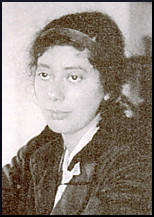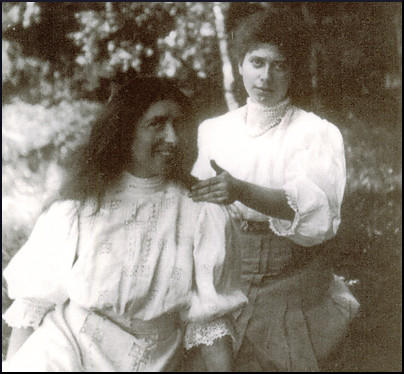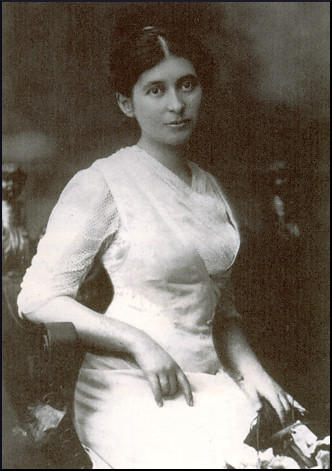Rose Strunsky

Rose Strunsky, the daughter of Elias Strunsky, a successful businessman, was born in Russia in 1884. Her mother, Anna Horowitz Strunsky, had married her husband when she was only sixteen-years-old. Rose's sister, Anna Strunsky later recalled: "The only recollection of Russia for me was of a long village street and barefoot children and rambling hovels. I remembered myself a little child standing in a patch of sunlight and poking my fingers into a wall and finding it soft as sand." (1)
Rose's mother was aware that she had two very bright daughters: "My two small daughters were pretty and intelligent and had good brains... When I used to go upstairs and look at them and think that they will have a college education and will have professions, one can imagine how I felt as a mother." (2)
In 1885 the Strunsky family emigrated to the United States: "The Strunskys came to America carrying little beyond the family feather-beds and copperware. Like other hundreds of thousands, they made their first home on New York's Lower East Side, crowded into a tenement on Madison Street with the toilet in the backyard." (3)
The Strunsky's lived in New York City before moving to San Francisco in 1894. During her last year in high school, Anna Strunsky joined the Socialist Labor Party (SLP). She later recalled: "You are born a socialist. You are born with music, or poetry or painting or science. You can't really become a socialist unless you're born that way." Her father, who had inspired her interest in politics, disagreed with her decision - "not because he grudged me to a great cause, but because he felt there was something amiss with the cause with which I had become infatuated." (4)
1905 Russian Revolution
After the 1905 Russian Revolution the Strunsky sisters established a branch of the Friends of Russian Freedom in San Francisco. Other members included Jack London, William English Walling, George Sterling, Cameron King and Austin Lewis. Anna became chairman and produced a leaflet calling for "sympathy and help" for the Russian people. Walling, who was just about to leave for Europe sent her a note: "I almost shouted with delight at the dash with which you have under taken your Russian movement. Your leaflet is the best yet." (5)

In November 1905 William English Walling wrote to Anna Strunsky telling her that he intended going to St. Petersburg to witness the impact of the 1905 Russian Revolution, he sent her a telegram inviting her to join him. "I intend to preach (in American publications) the necessity in Russia of: (i) The stirring of the masses to revolt - of the lower orders, to the utmost (ii) Widespread battle against Cossacks and police and execution of bureaucrats (iii) The most complete political revolution, perhaps a republic." (6)
Rose Strunsky in Russia
Anna and Rose took up the offer and arrived in December, 1905: "He (Walling) met us at the train, dressed in a big Russian coat and an astrakhan cap. I kissed him." Strunsky was excited by the revolutionary atmosphere of the city. "On the streets, they were selling pamphlets, the covers of which were decorated with the portraits of Karl Marx, Bakunin, Kropotkin. In the windows of book shops were displayed photographs of Sophi Perovski, who was executed for taking part in the assassination of Alexander II; of Vera Zassulich, the first to commit a deed of violence for political reasons in modern Russia; of Vera Figner, whose resurrection from the Fortress of Schlusselburg had just taken place... More astounding... were the cartoons which appeared several times a day were bought as quickly as they could be had - cartoons portraying the Czar swimming in a sea of blood, mice gnawing away the foundation of the throne... Was I dreaming? Free press, free speech, free assemblage in Russia." (7)
The sisters were shocked by the level of violence that they saw in Russia. They were in a restaurant along with William English Walling when they were singing "God save the Czar!". However, a young man sitting with his mother and girlfriend, refused to join in. An officer at a nearby table walked over to him and commanded him to rise. When he refused, he shot him dead. Anna Strunsky wrote to her brother, Hyman Strunsky about how the incident drew her closer to Walling: "On New Year's Eve we saw a student shot to death in a cafe for refusing to sing the national hymn, and our love which had been filling our hearts from the hour of our meeting suddenly burst into speech. It was baptised in blood you see, as was fitting for a love born in Russia." Anna also wrote to her father admitting her love for Walling: "I found Russia in the same hour that I found love. It was fated. Russia had stood for quite other things, but the man I love and who loves me, so tenderly, dear, as tenderly as mother, and as deeply has opened vistas before me and changed the face of things forever." (8)
On 26th January, 1906, Walling wrote to his parents about the woman he intended to marry: "She is considered by Mr. Brett the manager of Macmillans as nothing less than a genius in her work as a writer. She is the most known speaker on the Coast. She is loved, sometimes too much, by everybody that knows her - literary men, Settlement people, Socialists. All my friends know her. She is 26 and very healthy and strong... Of course she is a Jewess and her name is Anna Strunsky (but I hope to improve that - at least in private life - but we haven't spoken much of such things). (9)
Walling and Strunsky left Russia in May 1906. Rose Strunsky remained and continued to work with the revolutionaries. The couple arrived in Paris on 2nd June 1906, and married at the end of the month. The San Francisco Call newspaper carried the headline: "Girl Socialist Wins Millionaire". (10) Another newspaper, The Chicago American stated: "Socialism Finds Bride for a Rich Yankee in Russia" and compared their marriage to those of Graham Stokes and Rose Pastor and Leroy Scott and Miriam Finn, two rich men who married left-wing Jewish immigrants. (11)

In October 1907 Strunsky and Walling returned to Russia to join Rose. Soon after arriving in St. Petersburg they were all arrested. "When I opened the door of our apartment, I found a Chief of Police, gendarme spies, the proprietor of the hotel, and servants. The contents of our trunks lay scattered on floor, chairs and bed. The desks were littered with books and manuscripts. They were reading my letters, scrutinizing my photographs... When I entered the room and saw the confusion of clothes and papers, my checks flamed with anger and horror." Strunsky claimed they asked her: "Where do you hide your revolvers and dynamite." She told the interpreter. "Tell him that we are writers, and when we use weapons we use pen and ink and not arms." (12)
Other journalist friends such as Harold Williams and Ariadna Tyrkova, were also detained. All five were accused of writing articles supporting the revolutionaries. The American newspapers soon took up their case. The Boston Herald headed its story "Czar's Police Jail Harvard Men." (13) The The Chicago American reported that Elihu Root, the United States Secretary of State, had already protested about the behaviour of the authorities. (14) They were soon released but were deported.
First World War
Rose Strunsky joined the Women's Peace Party and argued for a negotiated peace. Other women involved in the organization included Anna Strunsky, Jane Addams, Mary McDowell, Florence Kelley, Alice Hamilton, Anna Howard Shaw, Belle La Follette, Fanny Garrison Villard, Emily Balch, Jeanette Rankin, Lillian Wald, Edith Abbott, Grace Abbott, Mary Heaton Vorse, Freda Kirchwey, Charlotte Perkins Gilman, Crystal Eastman, Carrie Chapman Catt and Sophonisba Breckinridge. Anna's husband, William English Walling described the activities of these women as "bourgeois pacifism". (15)
Rose Strunsky became involved with the journalist, Louis Levine. On 22nd June, 1920, she wrote to Anna Strunsky: All his desire seems to have petered out... As for my side of it - if I could have aroused any tenderness in him - the thing between us would have happened 7 years ago." (16) Soon afterwards Levine wrote to her and proposed marriage. The couple were married in September, 1920.
The couple moved to Wisconsin where he obtained a teaching job at Beloit College. However, the following year he accepted an offer from the Chicago Daily News to be a correspondent in the Soviet Union. After giving birth to a son, Boris, in October 1921, she travelled to Moscow, to be with her husband. Rose also wrote a couple of articles for McClure's Magazine. (17) Rose also translated books written by Maxim Gorky and Leon Trotsky.
Rose Strunsky Lorwin died in New York City in 1963.
Primary Sources
(1) James Boylan, Revolutionary Lives: Anna Strunsky and William English Walling (1998)
By mail, Levine proposed, or at least suggested, marriage and in September he and Rose were married. She moved with him to Wisconsin, where he had a new teaching job at Beloit College. At last Rose, thirty-seven years old, was no longer the third party in a family not her own.
Rose and her husband spent less than a year at Beloit; he accepted an offer from the Chicago Daily News to be a correspondent in the Soviet Union. When they left America, Rose was pregnant and remained behind in Paris when her husband went on to Moscow. Her old Finnish revolutionary friend Aino Malmberg arrived to keep her company. Later, Anna was with her when she gave birth to a son, Boris, in a German clinic in October 1921.
